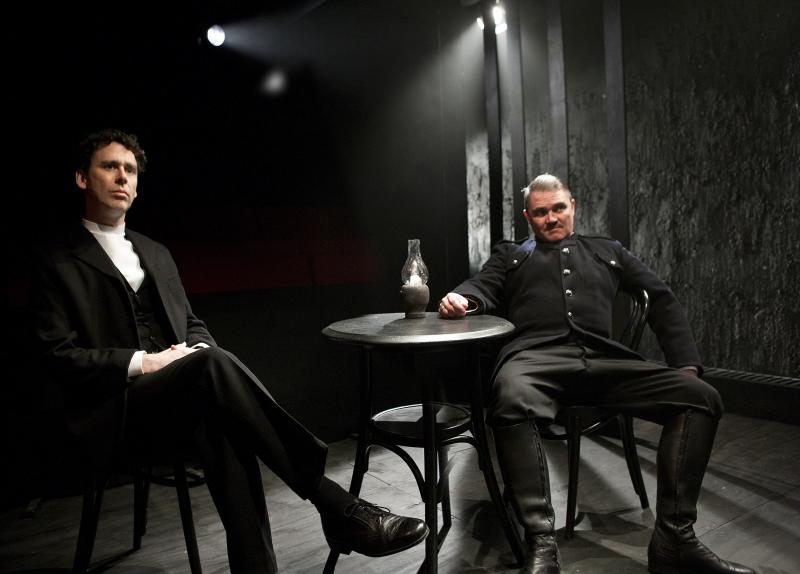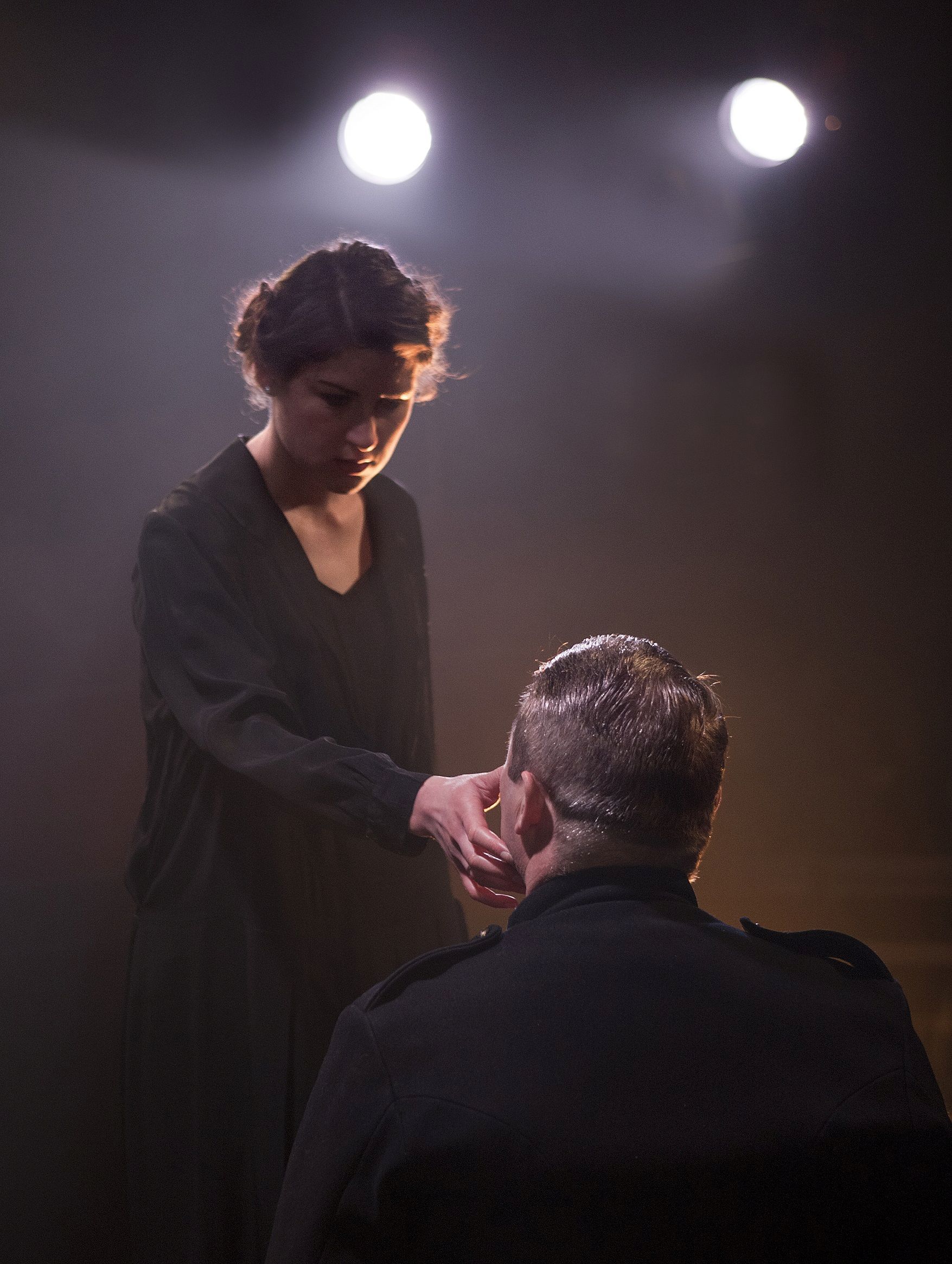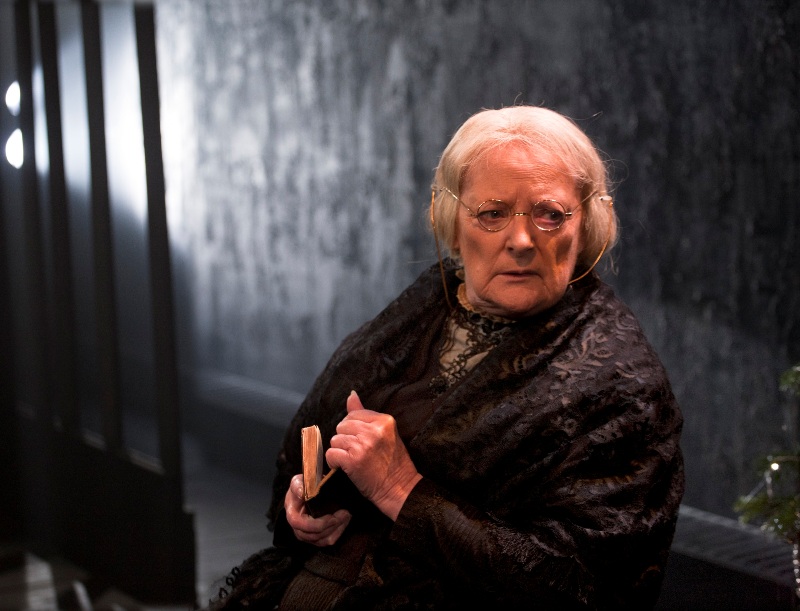The Father, Trafalgar Studios | reviews, news & interviews
The Father, Trafalgar Studios
The Father, Trafalgar Studios
Rarely performed Strindberg war-of-the-sexes drama misses the mark

This 1887 domestic drama by August Strindberg is rarely seen in London, and Abbey Wright’s new production of Laurie Slade’s new version might have seized the opportunity to give this gristly chunk of pre-Freudian sexual polemic a thorough 21st-century shake-up. That chance is missed.
Instead of bracing modernity (the play would have startled its first audiences with its naturalism), we’re presented with a historical hybrid of a world in which the characters wear approximations of fin-de-siècle dress, and the arrival of visitors is heralded by sleighbells, yet a husband may speak of his wife as a “treacherous cow” and blasts of Louis Armstrong songs (the lyrics muffled by gratuitous echo) fill gaps between scenes. This inharmonious muddle is only patchily relieved by the heroic efforts of one or two members of its cast to pull the production together.
 The territory is central 19th-century Scandi-noir, whose theme of “Love between the sexes is war!” is evident long before those words are spat from between clenched teeth. An army captain, Adolf, and his wife, Laura, are at loggerheads over the future of their teenage daughter, though it’s soon clear that the marriage had soured years before. The father (an entertainingly splenetic Alex Ferns, known to EastEnders fans as the Scots wife-beater Trevor) is a talented amateur scientist on the side, investigating distant planets by looking at bits of meteorite through a spectroscope. He’s keen to steer his intelligent daughter away from the irrational influence of a household dominated by women. We might blanch at this, but he has a point: the old nurse wants her to join the Salvation Army and his mother-in-law is encouraging her to commune with ghosts.
The territory is central 19th-century Scandi-noir, whose theme of “Love between the sexes is war!” is evident long before those words are spat from between clenched teeth. An army captain, Adolf, and his wife, Laura, are at loggerheads over the future of their teenage daughter, though it’s soon clear that the marriage had soured years before. The father (an entertainingly splenetic Alex Ferns, known to EastEnders fans as the Scots wife-beater Trevor) is a talented amateur scientist on the side, investigating distant planets by looking at bits of meteorite through a spectroscope. He’s keen to steer his intelligent daughter away from the irrational influence of a household dominated by women. We might blanch at this, but he has a point: the old nurse wants her to join the Salvation Army and his mother-in-law is encouraging her to commune with ghosts.
Laura, for her part, seems to oppose her husband on principle. Strindberg – by no means a straightforward misogynist as some have claimed – is interested in the effects of a patriarchal system on both parties in a marriage, and although the argument in this play may have been skewed by the playwright’s own miserable experience, it nonetheless makes some trenchant points. Keep a wife in a state of submission, the piece warns, and her resentment will eventually erupt like a poisonous boil.
The suddenness of Laura’s campaign of spite against her husband is, admittedly, a weakness in the play. But in this production both casting and direction compound it. Emily Dobbs (pictured above with Ferns) may believe she’s playing Laura as a coiled spring, but her lack of animation feels like inertia, deadening every encounter with Ferns’s Adolf in the early scenes. Meanwhile he, though a potent sexual force, is too much of a bruiser to convince as a frustrated academic. Eloquent when speaking of the difficulty of sustaining physical love – men love to be mothered, women like to mother, but they must remember to be lovers too – the pair reminisce about the passion they once shared, but it’s hard to imagine.
 Laura’s revenge is nasty in the extreme. Not content with intercepting the books Adolf needs for his research, she spreads false rumours about his mental health and then drives her husband genuinely insane by sowing doubts – Iago-like, with a casual comment – about whether he really is the father of their daughter. This hate campaign demands a much sharper, and bigger, performance than it’s getting here.
Laura’s revenge is nasty in the extreme. Not content with intercepting the books Adolf needs for his research, she spreads false rumours about his mental health and then drives her husband genuinely insane by sowing doubts – Iago-like, with a casual comment – about whether he really is the father of their daughter. This hate campaign demands a much sharper, and bigger, performance than it’s getting here.
Other facets of womanhood are more compellingly presented. Millie Thew gives a tenderly truthful account of Bertha, the daughter, her loyalties torn between her warring parents. Veteran June Watson (pictured above) is superb as the cuddly old nanny who, shockingly, betrays her beloved Adolf’s trust every bit as much as his wife does. Robert Wilfort as the nonplussed Pastor and Barnaby Sax as the beleaguered family doctor fight hard to make sense of the moral anachronisms of the production, but don’t. In short, this flawed but fascinating play is made much more flawed by the playing of it.
The future of Arts Journalism
You can stop theartsdesk.com closing!
We urgently need financing to survive. Our fundraising drive has thus far raised £49,000 but we need to reach £100,000 or we will be forced to close. Please contribute here: https://gofund.me/c3f6033d
And if you can forward this information to anyone who might assist, we’d be grateful.

Subscribe to theartsdesk.com
Thank you for continuing to read our work on theartsdesk.com. For unlimited access to every article in its entirety, including our archive of more than 15,000 pieces, we're asking for £5 per month or £40 per year. We feel it's a very good deal, and hope you do too.
To take a subscription now simply click here.
And if you're looking for that extra gift for a friend or family member, why not treat them to a theartsdesk.com gift subscription?
more Theatre
 The Producers, Garrick Theatre review - Ve haf vays of making you laugh
You probably know what's coming, but it's such great fun!
The Producers, Garrick Theatre review - Ve haf vays of making you laugh
You probably know what's coming, but it's such great fun!
 Not Your Superwoman, Bush Theatre review - powerful tribute to the plight and perseverance of Black women
Golda Rosheuvel and Letitia Wright excel in a super new play
Not Your Superwoman, Bush Theatre review - powerful tribute to the plight and perseverance of Black women
Golda Rosheuvel and Letitia Wright excel in a super new play
 Cow | Deer, Royal Court review - paradox-rich account of non-human life
Experimental work about nature led by Katie Mitchell is both extraordinary and banal
Cow | Deer, Royal Court review - paradox-rich account of non-human life
Experimental work about nature led by Katie Mitchell is both extraordinary and banal
 Deaf Republic, Royal Court review - beautiful images, shame about the words
Staging of Ukrainian-American Ilya Kaminsky’s anti-war poems is too meta-theatrical
Deaf Republic, Royal Court review - beautiful images, shame about the words
Staging of Ukrainian-American Ilya Kaminsky’s anti-war poems is too meta-theatrical
 Laura Benanti: Nobody Cares, Underbelly Boulevard Soho review - Tony winner makes charming, cheeky London debut
Broadway's acclaimed Cinderella, Louise, and Amalia reaches Soho for a welcome one-night stand
Laura Benanti: Nobody Cares, Underbelly Boulevard Soho review - Tony winner makes charming, cheeky London debut
Broadway's acclaimed Cinderella, Louise, and Amalia reaches Soho for a welcome one-night stand
 The Pitchfork Disney, King's Head Theatre review - blazing with dark energy
Thrilling revival of Philip Ridley’s cult classic confirms its legendary status
The Pitchfork Disney, King's Head Theatre review - blazing with dark energy
Thrilling revival of Philip Ridley’s cult classic confirms its legendary status
 Born with Teeth, Wyndham's Theatre review - electric sparring match between Shakespeare and Marlowe
Rival Elizabethan playwrights in an up-to-the-minute encounter
Born with Teeth, Wyndham's Theatre review - electric sparring match between Shakespeare and Marlowe
Rival Elizabethan playwrights in an up-to-the-minute encounter
 Interview, Riverside Studios review - old media vs new in sparky scrap between generations
Robert Sean Leonard and Paten Hughes make worthy sparring partners
Interview, Riverside Studios review - old media vs new in sparky scrap between generations
Robert Sean Leonard and Paten Hughes make worthy sparring partners
 Fat Ham, RSC, Stratford review - it's Hamlet Jim, but not as we know it
An entertaining, positive and contemporary blast!
Fat Ham, RSC, Stratford review - it's Hamlet Jim, but not as we know it
An entertaining, positive and contemporary blast!
 Juniper Blood, Donmar Warehouse review - where ideas and ideals rule the roost
Mike Bartlett’s new state-of-the-agricultural-nation play is beautifully performed
Juniper Blood, Donmar Warehouse review - where ideas and ideals rule the roost
Mike Bartlett’s new state-of-the-agricultural-nation play is beautifully performed
 The Gathered Leaves, Park Theatre review - dated script lifted by nuanced characterisation
The actors skilfully evoke the claustrophobia of family members trying to fake togetherness
The Gathered Leaves, Park Theatre review - dated script lifted by nuanced characterisation
The actors skilfully evoke the claustrophobia of family members trying to fake togetherness
 As You Like It: A Radical Retelling, Edinburgh International Festival 2025 review - breathtakingly audacious, deeply shocking
A cunning ruse leaves audiences facing their own privilege and complicity in Cliff Cardinal's bold theatrical creation
As You Like It: A Radical Retelling, Edinburgh International Festival 2025 review - breathtakingly audacious, deeply shocking
A cunning ruse leaves audiences facing their own privilege and complicity in Cliff Cardinal's bold theatrical creation

Add comment